CANEUS Conference Objectives
CANEUS 2002
The CANEUS 2002 workshop had the following objectives, which were met with a great measure of success:
- Assemble technical experts and programming decision makers from Canada, USA, Europe and Asia.
- Foster research and development collaborations among the participating countries.
- Identify and discuss strategies for focused MNT investment for Aerospace Applications.
CANEUS 2004
The CANEUS 2004 Conference has the following objectives:
- Provide participants with a complete understanding of the process required to advance radically innovative MNT concepts though to Aerospace system implementations of great commercial importance.
- Bring together Aerospace MNT communities from Canada, Europe, USA and Asia and, in the context of proposed system-level projects (point 3. below), identify synergies of great potential value that result from the combining of complementary skills, expertise, techniques, and basic technologies.
- Select promising MNT concepts and develop plans for pilot programs to advance their maturity and bring them, perhaps in useful combination, to the system level.
CANEUS 2006
CANEUS has a worldwide mission of fostering successful collaborations leading to the cost-effective transition of emerging MNT concepts to system-level application.
CANEUS 2006 will solidify the foundation that we laid in CANEUS 2004. We expect announcement of real partnerships within regions as well as internationally, aimed at transitioning MNT to Aerospace applications.
CANEUS Structure
CANEUS 2002
Spanning a period of five days from August 25-30, 2002, the workshop comprised 27 sessions. The areas covered in the workshop were space, defense, aeronautics, geophysics and environmental control.
CANEUS 2004
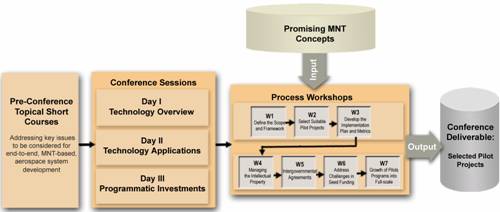 The CANEUS 2004 conference will include: 6 pre-conference short courses, 22 thematic conference sessions, 7 process workshops covering 14 concept studies that identify potential pilot projects, 3 poster sessions, and relevant technical exhibits.
The CANEUS 2004 conference will include: 6 pre-conference short courses, 22 thematic conference sessions, 7 process workshops covering 14 concept studies that identify potential pilot projects, 3 poster sessions, and relevant technical exhibits.
CANEUS 2006
- Format will be consistent with CANEUS 2004 and will consist of 3 days of Conference covering the topics related to the MNT Technology Development Pipeline and 2 days of Workshops to debate issues related to Concept Papers/Pilot Projects funded prior to the conference.
- Speakers at Conference sessions and Workshop Panels will be world experts and by invitation only.
- Short courses (1 day) on relevant topical areas will be conducted prior to the start of the conference. They will provide the technical background in key areas pertinent to the conference.
- Technical exhibitions will cover the state-of-the-art in MNT related tools and resources as well as end-user' applications.
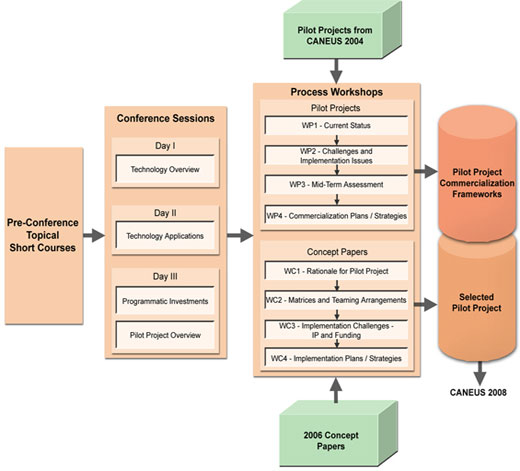
Conference Participants
CANEUS 2002
Spanning a period of five days from August 25-30, 2002, the workshop covered 27 sessions with approximately 100 invited speakers from Australia, Austria, Belgium, Canada, France, Germany, Italy, Japan, Netherlands, Spain, Switzerland, UK, and the USA. In addition to these presentations, we were fortunate to hear from two Nobel Laureates, Prof. Richard Smalley and Prof. John C. Polanyi. With representation from over 200 of the world's leading authorities in aerospace and industrial R&D, as well as in the MNT research and investment sectors, the workshop provided a truly unique opportunity for technology exchanges and networking amongst participants and attendees representing a wide cross-section of industry, universities and government agencies. A series of outings, industrial tours and networking opportunities rounded out the event.
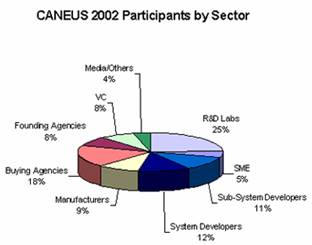
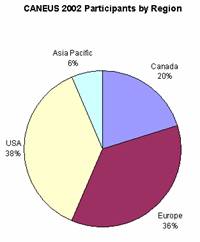
CANEUS 2004
The CANEUS 2004 conference will conclude with the development of "blueprints" for a set of Aerospace MNT development pilot projects that will lead to the production of system-level prototypes. These pilot projects will benefit from the coordinated efforts of the participating organizations that bring complementary skills and resources. CANEUS is working in close collaboration with senior government officials to develop innovative funding means tailored to fit the needs of projects that cross international boundaries.
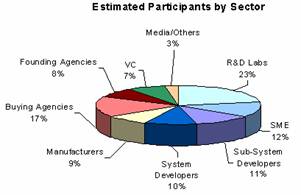
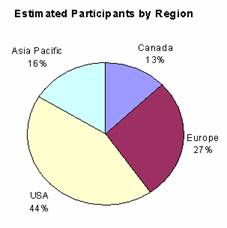
Conference Outcome
CANEUS 2002
The outcome of CANEUS 2002 included recommendations for future actions to be taken by governmental policy makers from the participating CANEUS countries as follow:
- Set up inter-governmental agreements that will serve as the basis for future collaborations and ensure the free flow of Aerospace MNT among participating countries.
- Identify the areas of complementary, core expertise within each nation which can be seamlessly integrated into the “technology pipeline” for Aerospace MNT.
- Develop both a ground-based and space-based MNT reliability testing protocol that will benefit from the Space technology pipeline.
- Implement low cost, rapid launch space testing opportunities that can advance Space MNT development far more quickly than is currently the case. In this way, there is the dual benefit of sooner realizing the Return-on-Investment (ROI) as well as “building in” reliability and robustness into Space MNT at a relatively early stage of development.
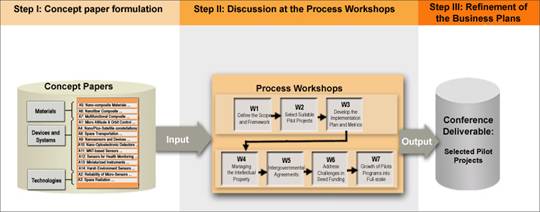
CANEUS 2004
The CANEUS 2004 conference will conclude with the development of "blueprints" for a set of pilot projects aimed at practical Aerospace MNT development trough to the level of a high-level system prototype. The pilot project document provides future investors, whether agency program managers or venture capitalists, with an authoritative and comprehensive plan for technology development. Promising concepts have been solicited in fourteen MNT topical areas (see below) spanning materials, devices and technologies. The Concept Papers will be prepared in advance of the CANEUS 2004 conference and will be discussed at the process workshops during the latter half of the conference. The pilot project “blueprints” are developed using the following step-by-step approach (see schematic below):
Last updated: 6/21/2021